The lunch bell rings, sending senior Bella Smith to Room 3 to serve her first behavioral detention, earned when she and a friend ripped down hallway posters endorsing their classmate Makenzie Solis for senior class president.
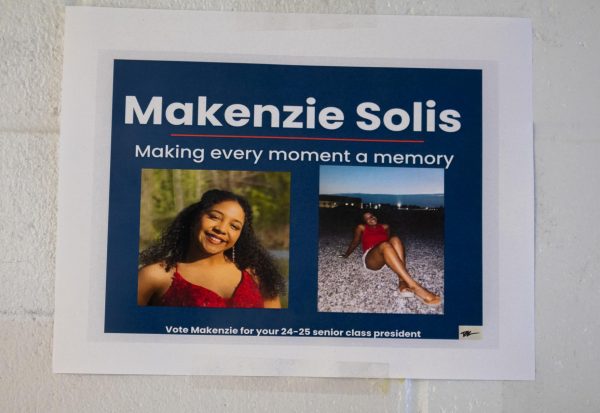
The senior class election is typically dull— posters are hung, votes are cast. This year’s election transformed into a contentious issue, ripe with scandal, mockery, and controversy. Those three words might be expected less in a description of a high school election than one of the current national election, but the state of modern politics has trickled down to America’s youth.
Many teenagers view politics as entertainment after seeing debate stages where candidates toss insults rather than discuss policy, or social media advertisements promoting one candidate by criticizing the other. Influenced by the national election campaigns and the actions of their peers, three of the four students running for class president and one vice-presidential candidate were pulled into these “win-at-all-costs” strategies. The rising tensions between the candidates may have started as a joke while they played politics, but the divisive “them or us” mindset created by their campaign strategies had real consequences for students like Smith who found themselves swept up in the wave of political drama.
The senior election started like any other. Solis, the candidate whose posters were ripped down, ran against three other candidates: Ava Breuer, Adam Doria, and Sydney Ross. As expected, candidates hung posters, posted on social media, and talked to their classmates.
“We recreated a Future album cover as our main poster, we thought it was pretty funny,” Doria said. “Hopefully people would see it, recognize it, laugh, and enjoy it. [It was] just to get name recognition out there as well.”
Breuer followed a similar strategy.
“I made flyers, and posted [them] on social media [and] around school,” Breuer said. “I also used the Barstool account and posted something on there.”
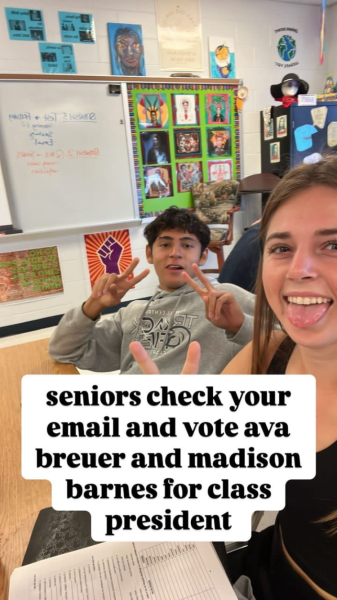
The Barstool account Breuer referenced is an Instagram account with over 1,800 followers. Breuer and a few other seniors run the account and usually use it to remind students of upcoming sporting events or spirit days. Breuer promoted herself and her running mate, Madison Barnes, through a post on the Barstool account’s story. She wrote, “seniors check your email and vote Ava Breuer and Madison Barnes for class president.”
Breuer would soon be criticized for this post, but not before Solis started receiving criticism of her own. Solis’ campaign was similar to her opponents,’ but with one major difference that changed the tone of the entire campaign. Solis gave one raffle ticket to each student that pledged to vote for her, entering them into a drawing for prizes, including four $15 gift cards. Other candidates questioned if the raffle strategy was fair.
“I’m not sure of the integrity of [the raffle],” Doria said. “Exchanging a vote for money, that’s a little questionable.”
Once Solis started receiving backlash for her raffle, the floodgates opened. Candidates began talking poorly about each other, each trying to defend their own strategies while critiquing the actions of others. Breuer’s use of the FHC Barstool account to advertise her campaign started to receive heavy criticism from her opponents. Breuer defended her choice, saying she was just leveling the playing field after Solis’ raffle.
AP Government teacher Nick Beckmann explained how the accusatory tone of national elections may have influenced the hyper-critical tone that took the forefront of the student election.
“National elections seem like they’re more feelings and entertainment-driven than ever before…there’s a lot more anger now than ever before… both parties [are] accusing each other of some really crazy things,” Beckmann said. “I think kids mimic what they see, plain and simple, and kids think that’s the normal style. It’s not the normal style.”
Doria’s running mate, Luke Paulus, mimicked this style, speaking bluntly when asked about his opinions of the other candidates’ strategies.
“There’s been a lot of below-the-belt campaign strategies between Ava Breuer using the…school account to promote her own personal campaign [and] Makenzie Solis providing financial incentives for people to vote for her,” Paulus said. “I think our competitors have been doing a lot of shady business in terms of the election campaigning. Adam and I pride ourselves in being ethical and upholding our values of integrity and respect for our opponents. Other people have not.”
Paulus’ insistence that he and Doria were the best candidates because of the actions of their opponents ties back to the national election and campaigns that center around tearing the other candidate down. According to Beckmann, this type of political division is exactly what draws teenagers’ interest toward politics.
“It’s an… us versus them type of thing. Kids like that controversy, and it’s not boring,” Beckmann said. “Trump helps students get involved because he is a culture person. He’s not some boring politician. You get the entertainment value, and young kids want to be entertained.”
Though Paulus and Doria were both confident that they campaigned in a respectful manner, some saw it differently. In a video posted on Doria and Paulus’ Snapchat stories, they referenced their intelligence as a reason to vote for them, saying “none of these individuals are willing to go ACT for ACT nor GPA for GPA with us.” Other candidates, especially Solis, viewed this as a direct attack on their intelligence and capability. Solis described the video as “backhanded.”
“Obviously they wanted a reaction, that’s what they were going for when they posted the video,” Solis said. “Just because you’re smart doesn’t mean you’re going to be the best person for this position… [and] people should realize that it was kind of coming from an elitist position. Trying to bring other people down really isn’t what it should be about. It should be about lifting people up and just proving that you’re the best candidate.”
Many people might be surprised to hear high schoolers calling each other cheaters and elitists over a class election, but Beckmann wasn’t one of them.
“What in today’s society would lead you to think that they would do anything else? Isn’t that what politicians do all the time? It’s just them mimicking what they see in the current election,” Beckmann said.
Paulus admitted to speaking poorly about his opponents in order to dissuade his classmates from voting for them and to get more students engaged with his campaign. Solis wasn’t the only candidate receiving his criticism — Breuer’s poor driving record was also brought up. Breuer hit a parked school bus with her car in April 2024, and, five days before the class election, hit a student walking across the school parking lot. Doria and Paulus brought up these incidents during the campaign process.
“Since [the initial poster], we’ve been running slander campaigns on Ava Breuer for being a bad driver and Makenzie Solis for having a raffle, which seems unethical,” Paulus said. “I always get a lot of engagement when I make jokes about Ava Breuer being a bad driver… so I had a phrase in the campaign video that said ‘We want to drive a culture with values of excellence and integrity, not drive into school buses.’”

Paulus’ strategy of engagement is a common one in nationwide politics. Social media has led to a greater amount of information that is available to the public, and Paulus is not the first to take political advantage of this.
“Social media has really changed everything with how fast information gets out. People are [posting]… narratives that are driven by engagement… if it helps their cause,” Beckmann said. “It’s really kind of depressing to see it in action.”
The candidates’ use of social media started positively. They used it to promote positive aspects of their own campaigns, rather than to tear down their opponents. Breuer’s first campaign post on social media encouraged students to vote for her because she would give them a voice, Solis promised a memorable senior year, and Doria and Paulus originally promoted their campaign through humorous posters at their own expense, not their opponents.’ However, these strategies were quickly abandoned.
“You can run on policy all you want, [but] that’s boring and that’s not going to stick with voters,” Beckmann said. “Student elections have always been popularity contests. Not a lot of schools are electing the kid who has these great policy proposals.”
Every single student candidate had some sort of “policy proposal” when they began their campaign. Breuer aimed to bring the senior class together and steer them away from cliques. Doria’s goal was to get more students involved in clubs and activities. Solis pledged to make everyone’s senior year memorable. Yet all three pushed their goals to the back burner to make room for fiery comments against other candidates since those seemed to better boost their campaign’s popularity. As national elections become more publicized, divisive, and anger-filled, America’s youth watches. Then they follow suit.





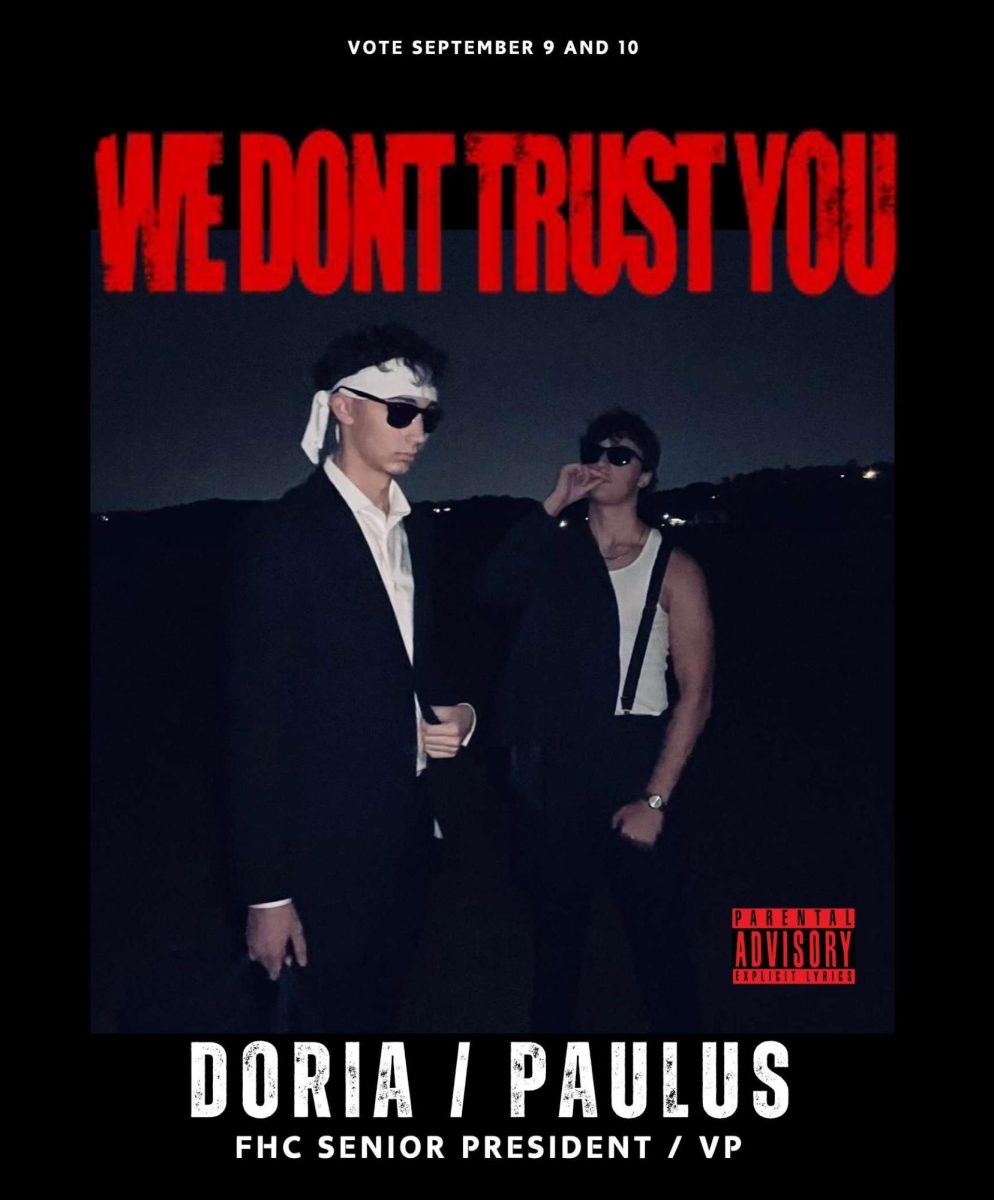
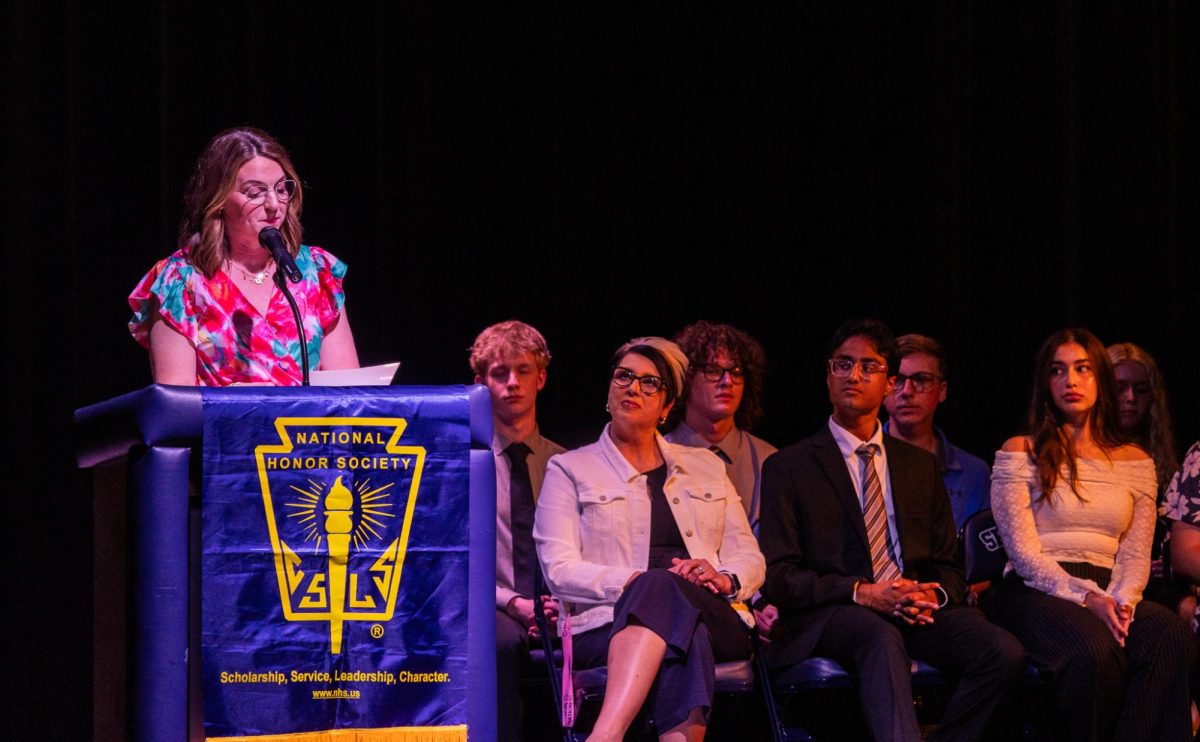
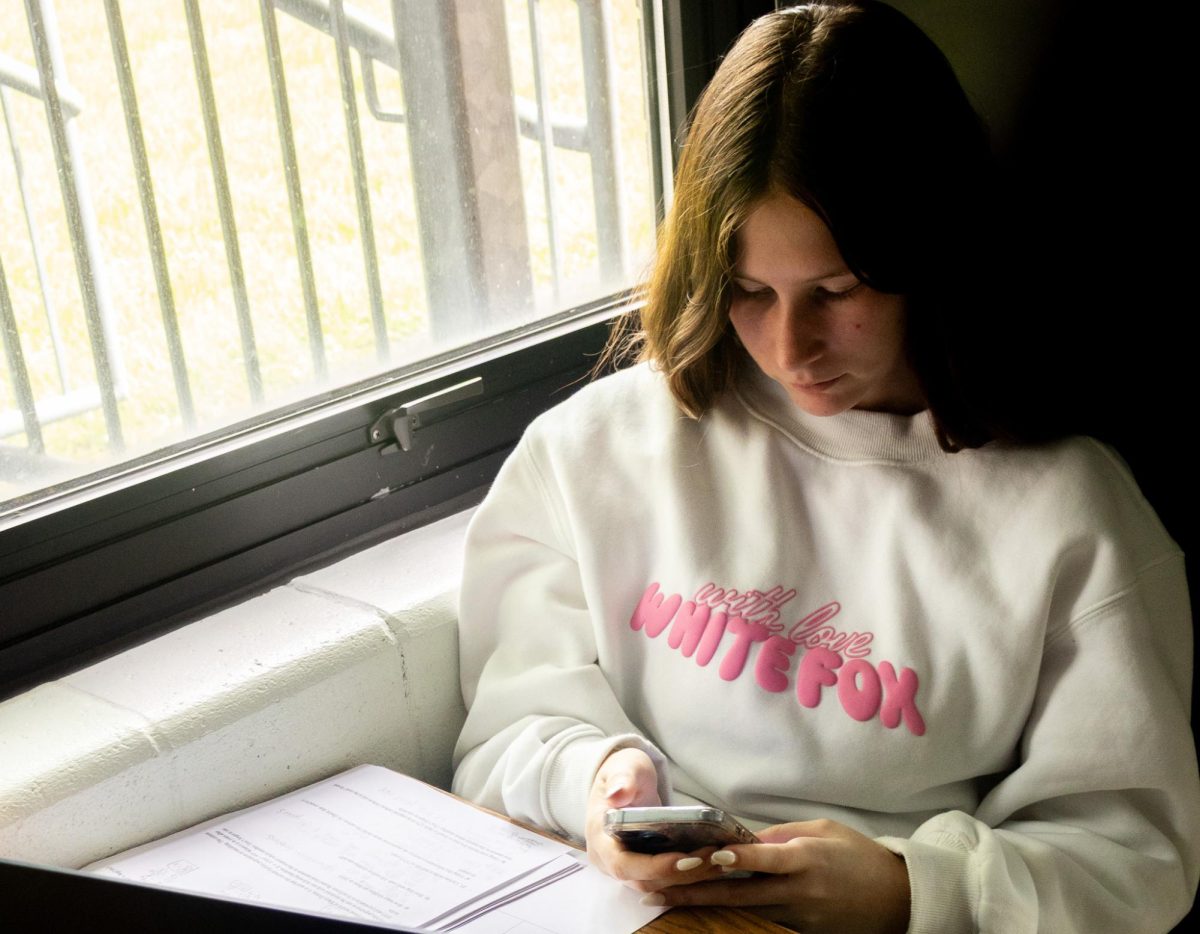
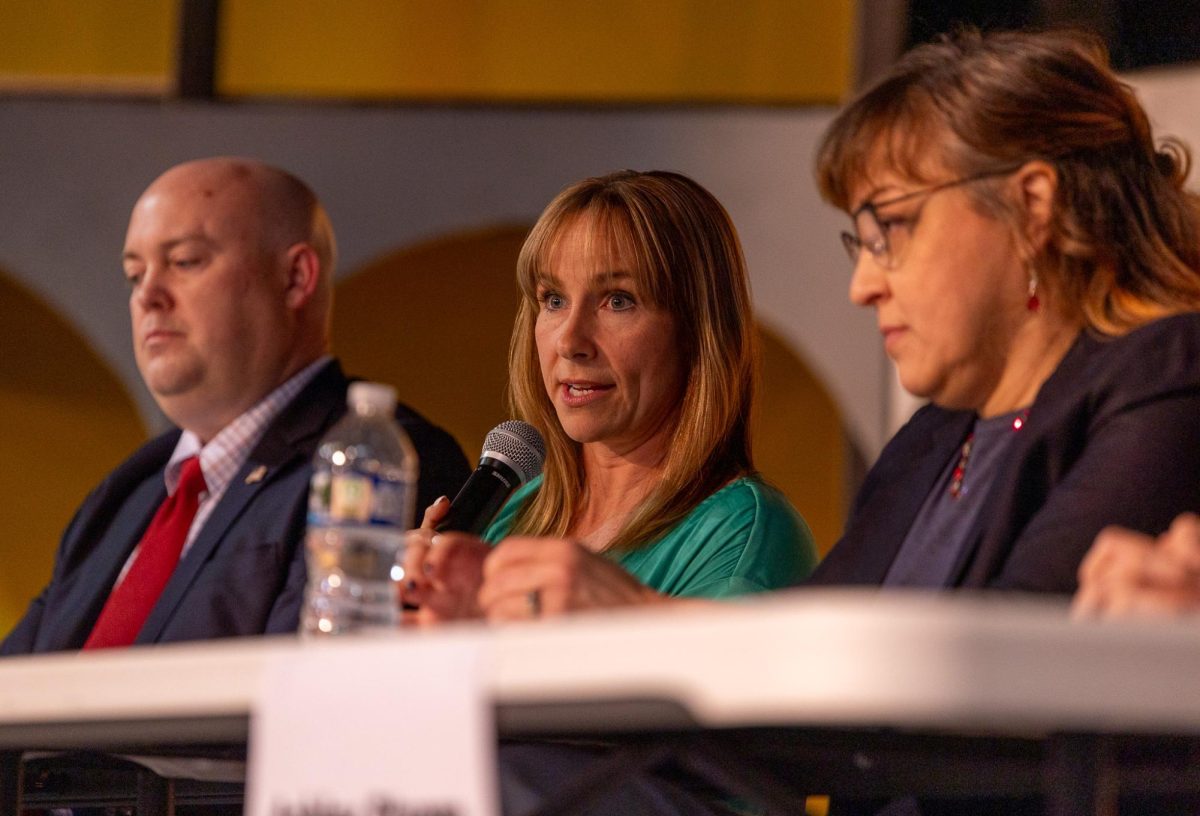



Mason • Dec 5, 2024 at 4:01 pm
This article is awesome! An amazing read.